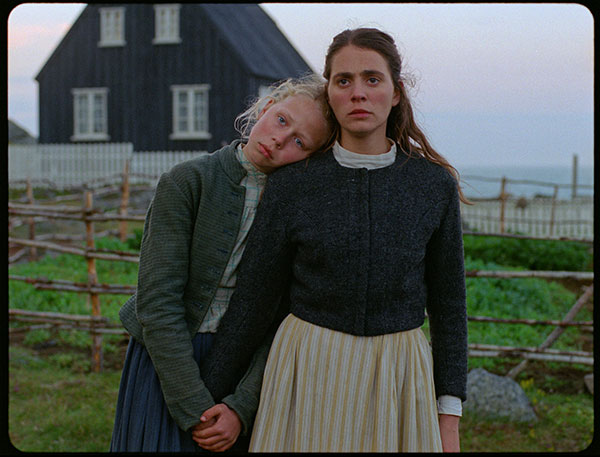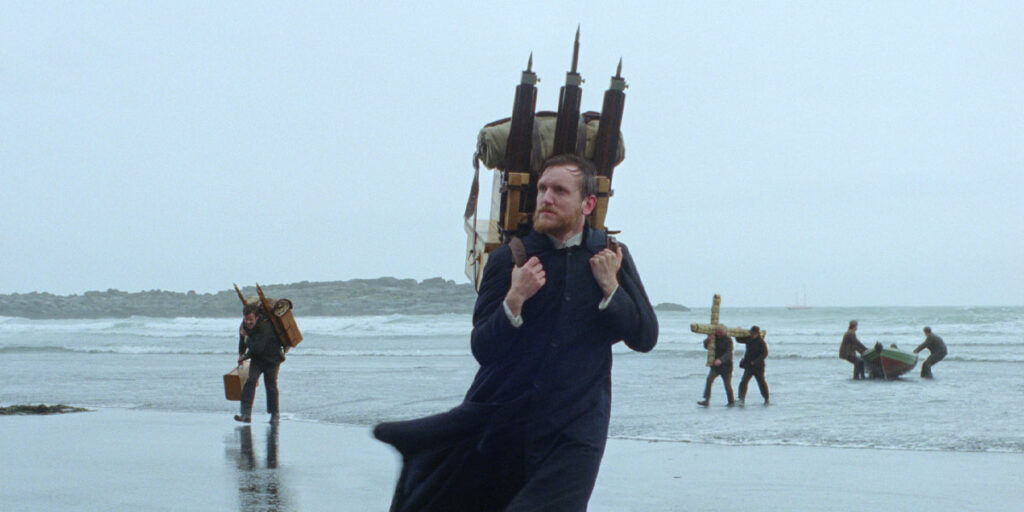Hlynur Palmáson again draws out the beauty and formidability of the Icelandic landscape in Godland, a journey of intense soul-searching and religious doubt.
Loosely quoting from the Bible, Nick Cave once sang: “…He who seeks finds, and who knocks will be let in”. As powerful as that line is, it perhaps simplifies the journey or the discovery, whatever form that may take. In Godland (Vanskabte Land), Hlynur Palmáson sets out in part to illustrate humanity’s complex existence and the ambiguous direction life can take. A follow-up to A White, White Day – Palmáson’s memorable 2019 meditation on grief – Godland similarly finds its footing in the vast extremes of Iceland’s natural world. Consistently awe-inspiring and always utilising the magical rurality of Iceland to its greatest potential, Godland’s lack of narrative thrust and muddled themes hold it back from true greatness. Look past these flaws though, and this elemental journey is as epic and breathtaking as you can imagine.
Godland frequently feels like Werner Herzog’s Aguirre, The Wrath of God (1972); the immense natural world that surrounds our characters in both films is simultaneously dangerous, daunting, and beautiful. Small drops of damp mist even crowd the screen at times in Godland, just like they do in Herzog’s Amazonian-based odyssey. This landscape is vital to Godland’s plot: a young Danish priest, Lucas (an emotive Elliott Crosset Hove, Wildland), is given the task of trekking across Iceland – an imposing, foreign world to him, but one under Danish rule at this point in the late 19th century – in order to build a church. His fresh ambition and naïve ideals become crushed by the imposing new world he finds himself in, similar to Klaus Kinski’s Aguirre and his descent into insanity. On the whole, characters in Godland are frequently captured as mere dots on the Icelandic terrain, their lives seemingly small and inconsequential in the grand makeup of our world.
Godland is heavy with themes of religion, and its vistas are also infused with a complex spiritualism. Lucas’ frequent, furtive looks to the horizon hint at a constant search within him to connect with God, a search which only increases in intensity as his journey continues. Along the way, he butts heads with Ragnar (another hardened, poignant performance from Ingvar Eggert Sigurðsson, A White, White Day), an Icelander at one with nature who holds a resentment towards Danes, with the tension between the two men often unspoken but always present. The small group of travellers eventually reach their destination: a tiny house beside which they plan to build this church. Godland is undoubtedly strongest in its opening hour or so; when they arrive at this place though, the film’s narrative loses noticeable impetus, and its 143-minute runtime starts to become more noticeable.

Some inexplicable character decisions confuse events further, and Palmáson ultimately seems unclear which themes to focus on most, resulting in a juggling act that never quite comes off. There is certainly real substance to go with the indisputable style, but it is a substance that undulates unevenly. On a technical level, Godland is a marvel, with its spellbinding and evocative cinematography, haunting saxophone-based original score, and swift, thoughtful editing – moments of intense religious doubt swiftly cut to a discarded cross floating in a river. The unsure direction that Godland ultimately takes lessens its impact, but similar to a Herzog film, it’s a sensory cinematic experience that you won’t forget for a while.
Godland premiered at the 2022 BFI London Film Festival on October 9, 2022. The film will be released in US theaters on February 3, 2023, and in UK cinemas and on Curzon Home Cinema from April 7.

